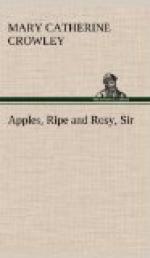“Not at all,” said Mrs. Moore, who had come out on the veranda where the young folks were chatting,—Frances swinging in the hammock, Ellen ensconced in a rustic chair with her fancy-work, and Joe leaning against a post, and still busy whittling. “Not at all,” repeated Ellen’s mother. “In America it is but little observed outside of the Eastern States. This is one of the beautiful traditionary customs of Catholic England, which even those austere Puritans, the Pilgrims, could not entirely divest themselves of; though among them it lost its former significance. Perhaps it was the gentle Rose Standish or fair Priscilla, or some other winsome and good maiden of the early colonial days, who transplanted to New England this poetic practice, sweet as the fragrant pink and white blossoms of the trailing arbutus, which is especially used to commemorate it. In Great Britain, though, it may have originated in the observances of the festivals which ushered in the spring. On the introduction of Christianity it was retained, and continued up to within two or three hundred years,—no doubt as a graceful manner of welcoming the Month of Our Lady. That it was considered a means of honoring the Blessed Virgin, as well as of expressing mutual kindness and good-will, we can see; since English historians tell us that up to the sixteenth century it was usual to adorn not only houses and gateways, but also the doors as well as the interior of churches, with boughs and flowers; particularly the entrances to shrines dedicated to the Mother of God.”
“And the 1st of May will be the day after to-morrow!” remarked Frances, coming back to the present.
“Yes. And to-morrow, right after school—that will be about three o’clock, you know,—we shall start on our tramp,” said Ellen. “As you do not have to go to school, Frances, you will be able to prepare the baskets during the morning. Come into the house with me now, and I’ll show you some which I have put away.”
II.
The next afternoon many merry companies of young people explored the country round about Hazelton in quest of May-flowers. That in which we are interested numbered Frances, Ellen, her brother Joe, their little sister Teresa, and their other cousins, Elsie and Will Grey.
“I generally have to join another band,” Ellen confided to Frances, as they walked along in advance of the rest; “because Joe does not usually care to go. He is very good about making the baskets for me; but, as he says, he ‘don’t take much stock in hanging them.’ Yet, to-day he seems to be as anxious to get a quantity of the prettiest flowers as any one. Will comes now because Joe does. But Joe has some notion in his head. I wish I could find out what it is!”
Frances speculated upon the subject a few minutes; but, not being able to afford any help toward solving the riddle, she speedily forgot it in the pleasure of rambling through the fields, so newly green that the charm of novelty lingered like dew upon them; and among the lanes, redolent with the perfume of the first cherry blossoms,—for the season was uncommonly advanced.




